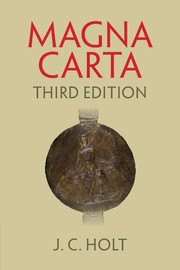Book contents
- Frontmatter
- Dedication
- Contents
- List of plates
- Preface to third edition
- Preface to second edition
- Preface to first edition
- Acknowledgements
- Abbreviations
- Introduction
- 1 The Charter and its history
- 2 Government and society in the twelfth century
- 3 Privilege and liberties
- 4 Custom and law
- 5 Justice and jurisdiction
- 6 Crisis and civil war
- 7 Quasi Pax
- 8 The quality of the Great Charter
- 9 The achievement of 1215
- 10 From distraint to war
- 11 The re-issues and the beginning of the myth
- Appendices
- References
- Index
- Plate section
7 - Quasi Pax
Published online by Cambridge University Press: 05 July 2015
- Frontmatter
- Dedication
- Contents
- List of plates
- Preface to third edition
- Preface to second edition
- Preface to first edition
- Acknowledgements
- Abbreviations
- Introduction
- 1 The Charter and its history
- 2 Government and society in the twelfth century
- 3 Privilege and liberties
- 4 Custom and law
- 5 Justice and jurisdiction
- 6 Crisis and civil war
- 7 Quasi Pax
- 8 The quality of the Great Charter
- 9 The achievement of 1215
- 10 From distraint to war
- 11 The re-issues and the beginning of the myth
- Appendices
- References
- Index
- Plate section
Summary
War was endemic in the medieval state. Self-help, distraint, the ordinary processes of administrative compulsion, the focussing of government on the castle, the use of outlawry and the frequent outbreaks of lawlessness, all imparted warlike features to peacetime rule. This was accentuated in times of crisis when urgent measures were taken for the munitioning, repair and replenishment of fortresses, and when the dispatch of mercenary crossbowmen to different parts of the country reflected closely and immediately the tactical and political concerns of the king. By May 1215 such a crisis had been experienced intermittently for nearly three years, especially in those areas which were to become the main centres of the rebellion, in the north above all, and in East Anglia and the home counties. Here men had become accustomed to preparations for war. By April 1215 the barons were negotiating in arms. By this time, too, the king had mustered large mercenary forces from Flanders, Poitou and Gascony. The crisis also had its political aspects. By 1215 all but the blindest of the English aristocracy must have been aware that loyalty was becoming a matter of negotiation with the king, that the ordinary ties which bound a feudal society together had become subject to political considerations which distorted them and which led the king to buy and his vassals to sell loyalty as if it were a commodity to be extracted and surrendered by extortion, or to be marketed in return for privilege and office. All this encouraged the drift towards war. Men had become accustomed to the possibility; they had prepared for it; they had been encouraged to think that it was an imminent danger. In the end the formal act of defiance which began it may well have seemed like a relief from the intolerable tedium of waiting for it and from the alternative but equal difficulties of continuing to negotiate in arms or abandoning warlike postures altogether.
- Type
- Chapter
- Information
- Magna Carta , pp. 210 - 231Publisher: Cambridge University PressPrint publication year: 2015



